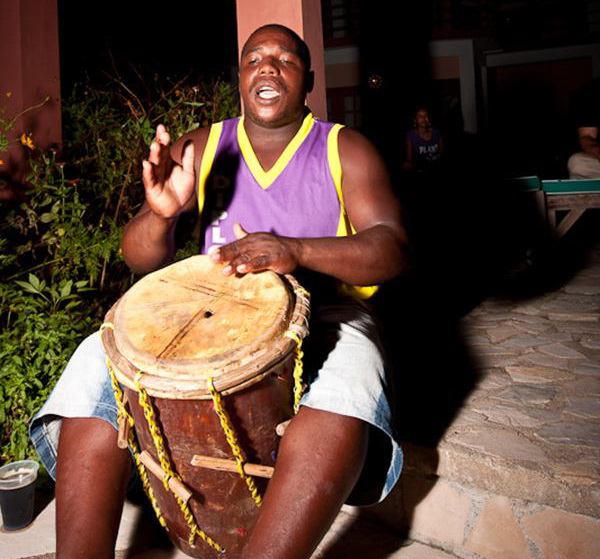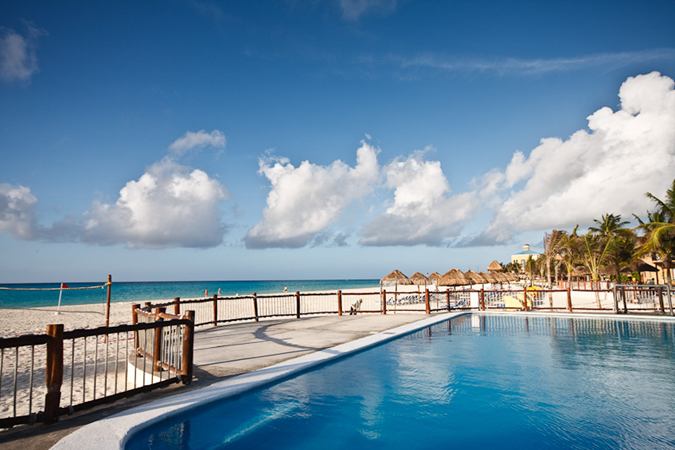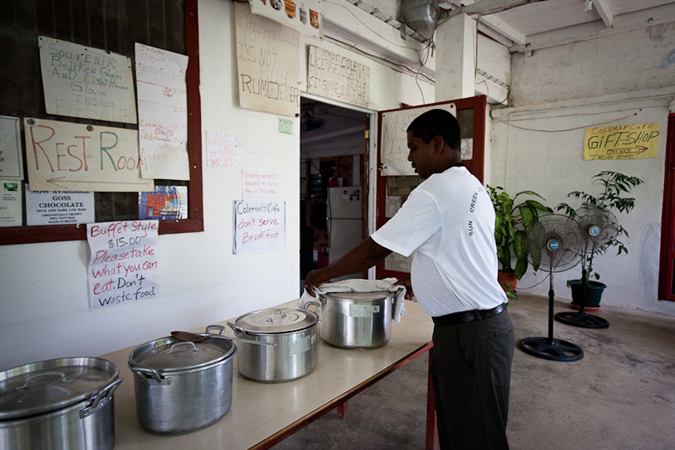The unspoiled nature, the diverse fauna and flora, the rich underwater world – all of which can be found in Belize, a small country on the eastern shore of Central America that can be passed through by car in a single day. Its territory is home to the remains of the Mayan culture dated back to the times between the 3rd and 8th century, when Belize was part of the Mayan Empire. Colonizers were present in the later era of the country as well. In the 16th century, the territory was under the rule of the Spanish and subsequently, British lumberjacks settled in. Belize is a country, where on one side you enjoy the beauties of nature and on the other, turn your head in disbelief looking at the living conditions (high number of citizens, primarily children infected with AIDS, poor hygienic conditions) the citizens live in during this advanced age.
Belize is located in Central America. For many Europeans, it is a very distant country, and in your case, it is not the country of your origin. Where do you come from and what path led you to Belize?
I come from the city of Vsetín in the Czech Republic. And how I ended up in Belize? From 2003 to 2005, I lived on the Caribbean island of Roatan, which belongs to Honduras, and worked as a scuba diving instructor. That’s where I met my wife Nicola, who’s from the United Kingdom and worked on her doctorate in marine biology on the island. After she was done with her research, we moved to England together. Nicola finished her studies and I continued working as a scuba diving instructor in the cold English waters. However, we kept dreaming and pondering about moving back to the Caribbean. Nicola was interested in working in this part of the world and eventually found a job in the south of Belize. We packed our things immediately and moved to Punta Gorda, Belize. Three weeks in, I found work as a manager of the TIDE travel agency. This was in the year 2008 and I, or rather we, are still in Belize.
Belize is well-known across the world for its unspoiled rich nature. It offers the second biggest coral reef in the world, attracting photographers from all over the world to take pictures of the local birds or scuba dive in the fascinating underwater world. Were you tempted by any of this?
A few years back, I lived to scuba dive (in Honduras as well as in England), but today, I don’t have much time. Despite that, I do have around 50 dives. Due to the fact that Punta Gorda is located on the southern shore of the country (scuba diving is much butter in the north) where the tourist industry is a little underdeveloped, I have to travel north to scuba dive. On the other hand, since the tourist traffic is low in the south, we have one of the most untouched jungles full off birds and wild animals. Sometimes I try to photograph birds, but my longest 135mm lens is not sufficient. If I am able to choose, I mostly enjoy photographing landscapes and nature in general. I also like to photograph people, festivals and carnivals of the Mayan villages, where the locals still live in wooden huts and keep to the old Mayan traditions.
You have stated ‘Manager’ as your profession. What does this position mean in this part of the world?
My job consists of running a small travel agency called TIDE Tours. It’s part of TIDE, a non-profit organization, which focuses on the preservation of the national parks in the south of Belize. I organize trips around Belize, be it a one day trip or an adventure for three weeks. One day trips to the Punta Gorda area the most popular. Tourists can experience the virgin soil of the nature, Mayan ruins, amazing farms specializing in the production of cocoa (the original Mayan way which dates a thousand years back), snorkeling and fishing. I am also in charge of accommodation and flight tickets for the tourists that come this far south. At the end of the year, I give all of the raised money back to the non-profit organization TIDE, which reinvests it into other projects.
Based on what you have said, you have a very interesting job in a magnificent part of the world. You have found your wife a long way from home. You and your wife must both miss your families, friends. How do you compensate for the distance between you and them?
It’s true that we miss our homes (family, friends, food – Czech for me and English for Nicola, the beer isn’t as good in Belize as it is at home, and you can’t get hold of a plum brandy here either). Although thanks to the internet, we can keep up with the news from home and friends. Facebook in particular is a great communication tool. And when we need to handle or arrange something urgently, we simply use the phone, possibly our parents call through a special IP address. The problem with telecommunications in Belize is that it is now state owned and the government blocks services such as Skype. They are trying to force the users of the internet to use telephones only, brining considerate amounts of money into the government’s treasury. Sometimes, we come home directly. The last time we were home was last Christmas and naturally we were there for our wedding in June 2010. Visiting our parents in Czech and in the UK is a complicated process in terms of organization and logistics and it is planned well ahead.
So you must be glad whenever you return to your homelands with your wife. A wedding is an exceptional event. How often are you able to visit your home towns?
We are of course happy to come home whenever possible. As I mentioned previously, we were home twice the past seven months, but that is a rare exception. It depends on where we currently live. It’s easy to go back home from the UK, as it costs a few sterling pounds with Easy Jet or some other low-cost airline. From Honduras or Belize, it is a little more financially demanding, thus the limited trips back home.
Many people can’t even imagine certain restrictions such as not being able to use Skype, an order coming from a government of the country they live in. Are there other political problems influencing ordinary citizens?
I wouldn’t call it political problems, even though there are things happening that make you (a European) stop and wonder how it is even possible. However, that is the case in most countries of the third world. For instance, when you wish to bring some things into the country (used personal things), you need to pay an import tax of 15 to 50% (the extent of the tax depends on the customs officer and on how many contacts you have). If you want to live in a country such as Belize, you need to reconcile with the fact that government officer’s work at a 20% pace and therefore you need to make contacts at the right places. The citizens of Belize (350 000 people live here) are used to it and nobody sees it as odd when for example the department of motor vehicles does not have the materials to make a driving license on stock and has to order them every time, making you wait for about 2 months before everything necessary arrives. These are however minor problems. The important thing is that Belize is an economically and politically stable country. You don’t have to worry about revolutions or coups, as it was the case in Honduras not long ago.
Is it possible to earn a living with your profession in a country like Belize? In addition, which group of people are well off and vice-versa?
I and my wife have stable jobs that accommodate for enough resources to be able to rent a house on the shore, feed ourselves and two big dogs and save something on the side as well. If one of us were to loose our job, we wouldn’t be able to make it financially. Belize is quite an expensive country to live in. The adjoining countries such as Guatemala, Mexico and Honduras are a lot cheaper. The reason for this is that unlike in the case of neighboring countries, everything has to be imported into Belize. And thanks to the import embargo on the neighbors, everything is imported from the United States. The food is as expensive as and sometimes even more expensive than it is in the United Kingdom. The price of Gas can be compared to prices in the Czech Republic. Obviously, there are a lot of poor people living here, especially in the villages but also in the capital, Belize City. Ones that are the best-off are the staff in the upper positions with the state administration, the owners of large companies (there are a few living here) and people that work for the international non-profit organizations effective in Belize. Employees of the tourist industry are also quite well off.
Are you planning to settle in Belize for good or is this just one of the temporary stops on a journey across the world full new adventures in life and career?
It is most probably one of the stops. Our working visas need to be updated every year and so far it looks as this will be our last year in Belize. Nothing has been decided yet, we will see what the future brings. We do not have any specific plans now.
How did you find out about the WoL project?
I found out about the WoL project only at my own wedding in June 2010. Zdeněk Dvořák was our photographer and during the preparations for the ceremony (he kept on photographing) we talked. When he found out that I live in Belize and enjoy photography, he mentioned WoL. It was the morning of my wedding day so I was able to perceive about 20% of what was going on around me. After all the official and ceremonial moments ended, we came back to the issue of WoL again. He showed me his weeks and I have to say I was impressed and consumed by the idea. For my first week, I documented the commotion of us moving from the Czech Republic to Belize. I must admit that taking 9 photos a day describing the mood and activities of each day is very challenging for me. I sit at the PC all day at work and then do the same at home. So I was a little surprised when I realized that I have photographed things, situations, moments and images which I haven’t noticed before, let alone photographed them. That is why I consider this project so interesting.
 |
 |
 |
 |
 |
 |
 |
 |
 |
